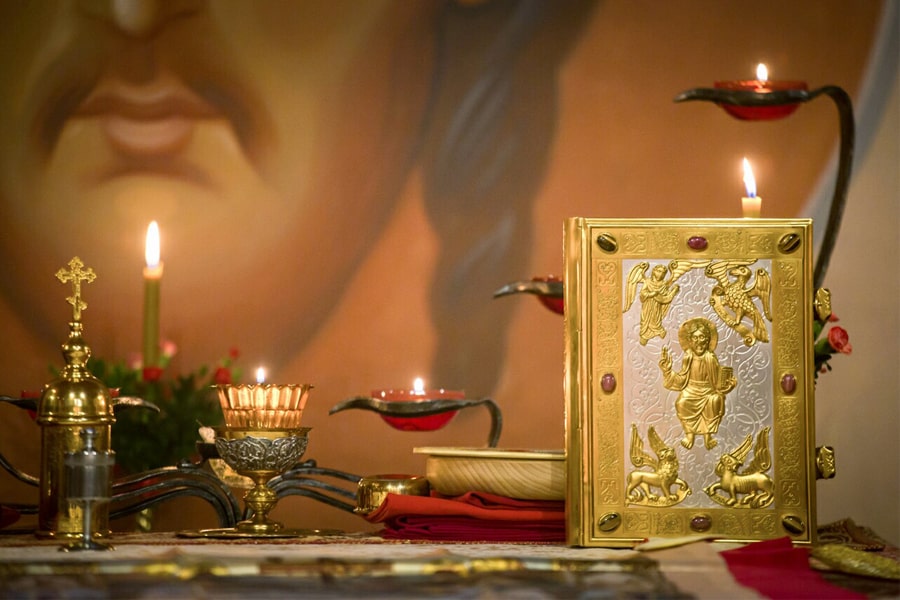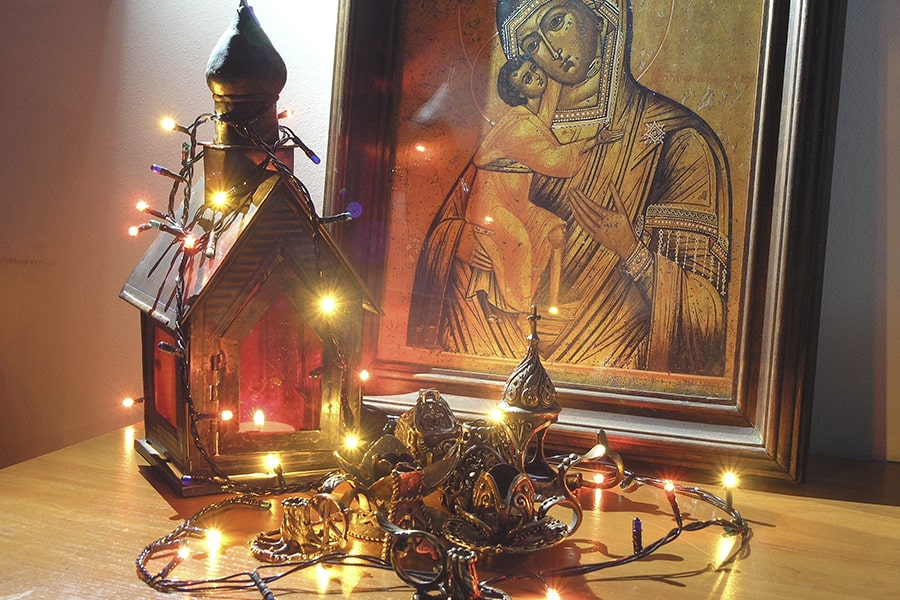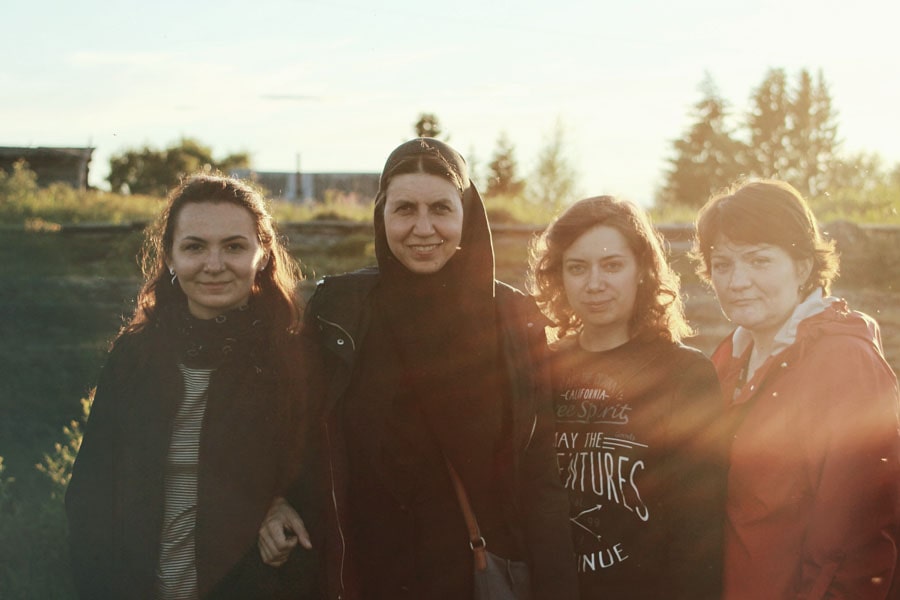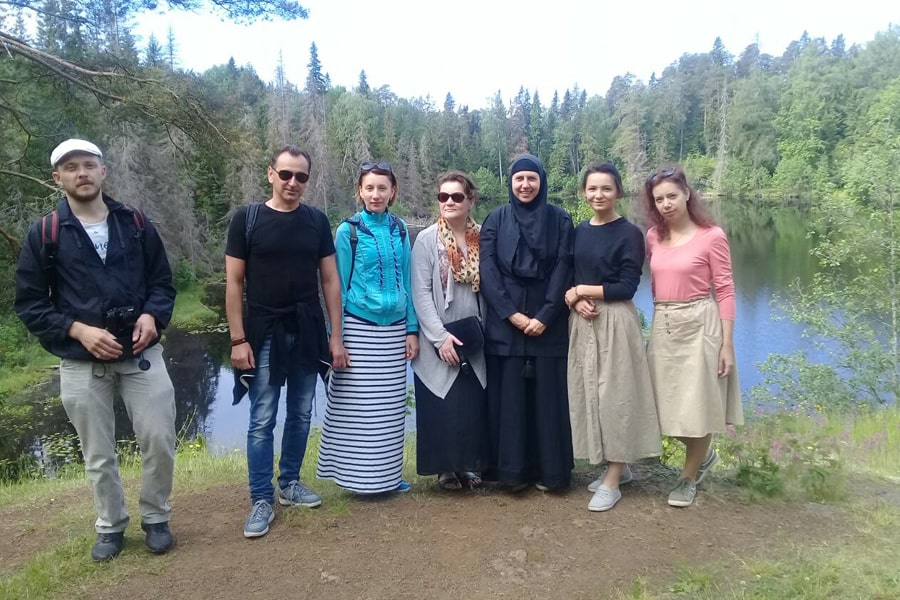
At the door of the non-ferrous metal products workshop, we were met by the noise of the tools and saw the concentrated looks of the busy people who were working hard and did not seem to be paying attention to newcomers. I had come here to observe with my own eyes all of the beautiful things that could be made from a piece of metal and to know what it means to work with inspiration.
"Some of the techniques that we use have been around since the 17th and 18th centuries", says Ivan, the head of the production and the deputy director of the workshop, as he starts the tour. "Galvanoplastics, for example, was invented more than 200 years ago by the physicist and inventor Boris Jakoby. The sculptures on the arcs, dome drum and the iconostasis of the Isaakiyevsky Cathedral in St. Petersburg were made in this technique. The filigrane technique has been around since the sixth century; it became known in Russia at around the tenth century and reached its heyday between the 15th and 17th centuries".
Ivan joined the studio in 2011 and has worked his way up from apprentice to head foreman. Today, he is the focal point for all matters related to production.

"My first job here was to cut up the sheets of galvanised metal," says Ivan. "I used to come in the morning, take up the disc grinder, and do the cutting all day. By lunchtime, I was holding the tool against my belly so my hands would not shake, and by the closing time my fingers were all numb."
At the dawn of Ivan's career at the workshop, the production processes were in a state of flux. The people were at the beginning of their learning curves and were continuously adjusting and perfecting their techniques.
"The most important change was the coming together of the team. We had come from different backgrounds. Andrey was a pattern-maker and a former construction worker, Pavel used to work as a paramedic, Andrey as a masseur, and I have a background in psychology. But all of us have found our vocation here at the workshop. Without this core of the key people, there would be no other choice but to rebuild production from scratch. This is a team that has stuck together for a full seven years. People come here only to do their jobs are probably not going to stay here very long. Those who do stay are people who had once come for help, and once helped, and grateful for the help, try to leave a part of themselves in every one of their works. This is more than just a job. It is life.
![]()
The people at the workshop are constantly working on expanding the product range, which now includes articles as diverse as tabernacles, arcas, Gospel covers, crosses, candle holders, crosses and icon lamps. There is a great taste for innovation. Only recently, several new products were launched: small lampads and candle holders for domestic prayer, key chains and car icons.
"As an artist, I am averse to routine and am always keen to create something fresh and new. Despite our strong focus on church focus, there is always an opportunity to add a personal touch. I enjoy working with natural materials, such as wood, clay and chamotte. I had an idea to use these together with cold metal. The result was a series of exquisitely shaped vigil lamps and incensories."
In this age of technology, people are still attracted in one way or another to natural, hand-made things. All the products made here are hand-made. Any mass-produced item, however beautiful, will still be different from a product made by hand.
![]()
Ivan's colleague Olga joins the conversation. "Working here has been a tremendous experience. I appreciate the opportunity that I have here to realise my potential, the trust that I have from my supervisor and colleagues. This is something that I value a lot," says Olga.
In many respects, the work at the workshop revolves around faith. Many who joined the team as churchless and secular have become strong believers; they partake regularly of the holy sacraments and participate in church life. Olga is one example.
"Here, I have developed an understanding of the faith. I feel that I would not have been able to respond to many challenges in my life if I had not been working here, like finding employment, working to my full capacity and finding the support of the fellow human beings. I hope that we can maintain the spirit of generosity, kindness and patience towards one another, that we do not walk away from one another but try to meet them halfway."
In most cases, newcomers will receive basic information about faith from Pavel, a graduate from the Minsk School of catechists, and formerly an ambulance paramedic. For Pavel, the decision to change his career came at a difficult moment in his life. He took up the new job, which to him also meant retiring from the world in a sense. While at the workshop, he also began to assist the celebrant priest in church services and joined the choir of the lay brothers.
"In here, I have found a new meaning to my life, which is now at the centre of what I am doing. Working at the monastery and making liturgical products, I have directed all my life to change my inner attitudes. Unless I can do that, the people around me will suffer, and I cannot let this happen. The change within cannot happen without God's help, but this does not relieve me of the need to work hard on it. My obediences at the workshop, in the choir and in the altar are all a part of this work.
The thread breaks where it is weakest, as they say. This is particularly true at the convent. The enemy won't try to break through a brick wall or reinvent the wheel. It will always hit at your weakest spots. If you have difficulty dealing with your frustration, you will be tempted to show your frustration time and time again; if you are in the habit of gossiping and judging, you will be tempted to do so time and time again.
Resisting the temptation takes a lot of patience and effort. The hard work of the spirit. There is no other alternative. You are doing obedience. People will come to a monastery to change themselves, to develop humility and to live at peace with themselves. But many people also expect humility from the nuns without being prepared to be humble themselves. 'I have come. Treat me well. Be a saint. And pay me a large salary', they would say. But people come to the monastery to work for God. Father Andrey Lemeshonok likes to quote the words of Apostle Pavel: "Give blood, take in the spirit". In here, this is the principle that works."

Nun Yevgenia has a lot to say about the struggle of the spirit, the importance of the prayer and of the church sacraments.
"During my first year here, I insisted that everyone attend the prayer on Thursday," says Nun Yevgenia. "But I soon came to realise that faith could never be imposed. No-one could be taken to heaven against their will. It is a matter of individual responsibility and understanding to appreciate the need for prayer, confession and the Holy Communion to fight the spiritual battle that is underway every day of your work at the Monastery. The enemy is literally behind your back. We are making liturgical objects to be kept in the Altar - the enemy will not just sit back and let you do it."
Each day at the workshop starts with a prayer: the morning prayer rule, readings from the Scripture and the Apostle, ten Jesus Prayers and a Prayer for Unity from Starets Sophronius (Sakharov). At lunchtime, Akathists to multiple saints are read, including to John of Shanghai, George the Victor (the workshop keeps a part of the saint's relics), Saint Spyridon, Bishop of Trimythous, and Saint Nicholas. The Akathist to the Icon of the Holy Mother of God "Insatiable Chalice" is read on multiple occasions to provide spiritual support and pray for the protection of the Mother of God for sufferers from alcohol and drug dependencies.
Interestingly, even the annual leave is a team enterprise. Every year, Nun Yevgeniya arranges pilgrimages for workers and their families that last for several days. They have already visited the Pskov Pechory Lavra, Holy Annunciation Nikandrova Desert, Solovki and Valaam islands. According to Nun Yevgenia, the visits build cohesion within the team workers and strengthens their spirits.

Today, the workshop employs 15 people. Recently, it was joined by several young graduates from the jewellery vocational school. When asked about the future goals of the workshop, Nun Yevgenia replies, with a smile:
"Seek peace within yourself, and thousands will be saved around you". I wish for all of us to be held together by the spirit of unity, and so that we do not judge one another. Coordination and support for one another are essential when making liturgical objects. They are also very hard to keep, as the enemy is keen to distract us and lead us astray. Anyone working at the monastery should challenge oneself to keep growing, continuously and without stop. In the spiritual life, one cannot afford to be stuck in one's progress at any stage. One needs to be watchful and demanding of oneself; one should never lose sight of Who he is serving and why. Any obedience will challenge us to make a discovery about ourselves and change our ways. One needs to have a watchful spirit, and a strong connection to God to be able to notice and feel for their neighbours."